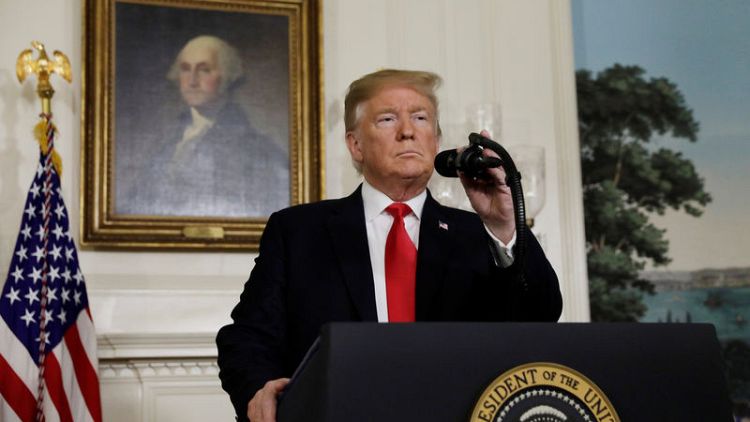By Richard Cowan
WASHINGTON (Reuters) - President Donald Trump's bid to build a U.S.-Mexico border wall and end a monthlong partial government shutdown suffered a blow on Tuesday when the U.S. Supreme Court left in place for now a program protecting young illegal immigrants from deportation.
The border wall, government funding and "Dreamer" immigrants have become intertwined in an epic Washington battle being waged by the Republican president and Democrats in Congress. The Supreme Court ruling deprives Trump of a key bargaining chip.
Amid this battle, an array of government agencies have not been fully operating since Dec. 22 and 800,000 federal employees are not being paid.
On Saturday, Trump proposed ending the government shutdown by fully funding the one-quarter of U.S. agencies that are affected. In return, he would get $5.7 billion (4.4 billion pounds) towards building a southwestern border wall that Democrats oppose. Trump also is offering to restore temporary protections for Dreamer immigrants who were brought illegally into the United States as minors.
In 2017, Trump moved to end the Dreamers' protections, triggering a court battle.
Democrats promptly rejected Trump's plan as insufficient, warning they would not trade a temporary restoration of the immigrants' protections in return for a permanent border wall that they view as ineffective.
But with the Supreme Court refusing, at least during this term, to consider an administration appeal of lower court rulings allowing continued temporary protections for the immigrant youths, Trump may have lost his main negotiating point.
Instead, the Deferred Action for Childhood Arrivals program established by then-President Barack Obama in 2012 lives on with or without approval by Congress.
Before the Supreme Court's announcement, U.S. lawmakers were poised this week to take up competing remedies for ending the partial government shutdown, which has interrupted scores of vital federal services.
Senate Majority Leader Mitch McConnell will introduce Trump's offer later on Tuesday, according to an aide. But it was unclear whether the Senate would vote on it this week.
Democrats in the House of Representatives, meanwhile, would also end the partial shutdown of agencies including the departments of Justice, Homeland Security, Agriculture, Commerce, Labor and Interior. While their legislation would contain new border security money, there would be nothing for a wall.
Once the government reopens, Democrats said, they would negotiate with Trump on further border security ideas.
Representative Jim Clyburn, the No. 3 House Democrat, welcomed any effort by the Republican-led Senate to debate and vote on legislation to reopen the government following that chamber's monthlong abstention.
"This gets us started," Clyburn told MSNBC in an interview.
There were no guarantees that votes by Congress this week actually would break the impasse, as Trump held firm on his $5.7 billion demand and Democrats said they would not talk about that until the government reopens.
Many federal employees and contractors were turning to unemployment assistance, food banks and other support as the shutdown entered its second month. Others began seeking new jobs.
U.S. airport security officer absences rose to a record high over the weekend with some airports experiencing longer wait times and a least one major East Coast airport closing one security checkpoint.
Federal courts will soon exhaust whatever funds they have been operating on since Dec. 22. Trash has piled up at some national parks, the collection of data vital to farmers, investors and others has been disrupted and the ripple effects of the shutdown threaten to damage a U.S. economy that had been humming for several years.
The funding standoff comes at time when fears of a global recession have been rising as the blockbuster Chinese economy slows.
(Writing by Richard Cowan and Susan Heavey; Editing by Bill Trott)
